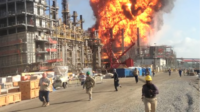 The death toll from Monday’s poultry plant fire in China has reached 119.
The death toll from Monday’s poultry plant fire in China has reached 119.
Sources say the fire was caused by leakage in tanks of ammonia used as a coolant.
In a scene reminiscent of New York’s fatal Triangle Shirtwaist Factory fire in 1911, there were reports that workers trying to escape the fire found exits locked – to prevent theft and to keep them from stepping outside for breaks. With only one door available for use, workers panicked and trampled each other in an effort to get out of the building.
China’s approach to worker safety has come under fire in the wake of a series of recent industrial disasters and an annual worker death toll much higher those of industrialized nations, although the Chinese government has made efforts to improve safety conditions. Safety exits are legally required to be kept open and clearly marked, but critics say employers more interested in productivity than safety frequently violate the law.
Work-related fatalities in China have decreased in recent years; 75,572 in 2011, as compared with 79,552 in 2010, according to the State Administration of Work Safety. The U.S., with a population less than one fourth the size of China's, has fewer than 5,000 occupational fatalities a year.
China’s ongoing economy boom appears to have left workers and their safety behind. Industrial accidents remain common. An explosion at a coal mine in Sichuan last month claimed the lives of 281 miners. Two subsequent factory fires in the days following that tragedy killed two workers.
The latest incident keeps the spotlight on Asian occupational safety conditions, which came into sharp focus in April with a Bangladesh garment factory collapse that killed 1, 127 people. Another Bangladesh garment factory fire a week later killed another eight people.
Tom O’Connor, executive director of the National Council for Occupational Safety and Health (National COSH), said employers and government officials in Asia should treat the latest tragedy as a wakeup call to improve working conditions.
“In Asia and the U.S. alike, these tragedies must remind us that workers’ safety must outweigh profits and workers must receive adequate protections on the job,” said O’Connor. “On both continents, an injury and illness prevention standard could require employers to find and fix workplace hazards before such a tragedy can occur. Whistleblower protection is also essential so that workers do not fear retaliation for pointing out or voicing up about unsafe working conditions.”







